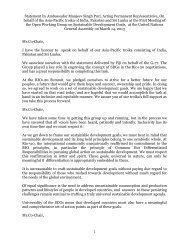STATE OF THE WORLD'S CITIES 2012/2013 Prosperity
STATE OF THE WORLD'S CITIES 2012/2013 Prosperity
STATE OF THE WORLD'S CITIES 2012/2013 Prosperity
You also want an ePaper? Increase the reach of your titles
YUMPU automatically turns print PDFs into web optimized ePapers that Google loves.
Treating Quality of Life as a By-product<br />
UN-Habitat survey results show that the more committed<br />
the city is to promote quality of life, the more the chances<br />
that the effects will be broad-ranging. There is a clear<br />
positive association between a high degree of commitment<br />
to address quality of life and the possibility of designing<br />
specific policies. Unfortunately, the opposite also applies,<br />
and many cities treat quality of life as a by-product or an<br />
‘after-effect’ of policy interventions. Even where some cities<br />
perform well under other dimensions of prosperity, they<br />
fail to deliver better quality of life. Abidjan, Dakar, Dar<br />
es Salam and Kampala illustrate well this situation: they<br />
feature moderate or weak values in the “City <strong>Prosperity</strong><br />
Index”, but rank even much lower for quality of life, which<br />
goes to show that this dimension cannot be considered as an<br />
indirect component of any urban policy agenda.<br />
A number of studies have shown that the various<br />
determinants of quality of life generate complex interactions<br />
and diverse causal relations. Sometimes, efforts to promote<br />
one element can have unexpected detrimental effects<br />
on other elements; for example, prioritizing economic<br />
growth per se can result in negative environmental<br />
impacts. In other cases, positive linkages between<br />
these determinants are quite obvious; for instance, the<br />
provision of green open spaces brings health benefits to<br />
the population. In some other cases, the relationship can<br />
be less evident; for example, individual housing choices<br />
may have environmental impacts that affect quality of<br />
life in different ways. 10 All too often, cities do not clearly<br />
perceive the complexity of these interactions and assume<br />
that interrelations will always be positive. Several cities<br />
in Asia and the Arab States that are experiencing high<br />
economic growth are mostly focusing on infrastructure<br />
development in the pursuit<br />
POLICy Cities<br />
that focus<br />
only on economic<br />
development and<br />
provide services that<br />
are not public goods,<br />
may leave the urban<br />
poor, migrants, ethnic<br />
minorities and other<br />
vulnerable groups with<br />
serious difficulties to<br />
pay for the improved<br />
services, reducing the<br />
possibilities for them to<br />
enjoy quality of life.<br />
of higher productivity and<br />
therefore higher incomes,<br />
assuming that this will lead<br />
to better quality of life in<br />
the long term. Generally,<br />
that is what happens,<br />
since economic growth<br />
increases purchasing power<br />
and demand for goods<br />
and services including<br />
education, entertainment,<br />
financial services and<br />
housing, which, in turn,<br />
not only create new<br />
61<br />
Quality of Life and Urban <strong>Prosperity</strong><br />
employment opportunities<br />
but also contribute to<br />
higher quality of life. But<br />
there may also be negative<br />
consequences.<br />
However, UN-Habitat<br />
policy analysis shows that<br />
most surveyed cities in the<br />
developing world have<br />
no clear policies, actions<br />
and reliable procedures<br />
to deliver and expand<br />
quality of life to the whole<br />
population. With the<br />
exceptions of Singapore,<br />
Davao, Ho Chi Minh<br />
City and Chon Qing in<br />
Asia, Fort-de-France and<br />
Medellín in Latin America<br />
and the Caribbean, and<br />
Doha in the Arab States<br />
(whose commitment to<br />
quality of life was highly<br />
commended), experts<br />
took a critical view of the<br />
42 other cities on that<br />
count. They found public<br />
administrations to be<br />
generally inefficient and<br />
with poor incentives to<br />
devise specific quality of<br />
life policies for lack of adequate financial resources, trained<br />
staff or political interest.<br />
Positive exceptions can be found, such as Cebu,<br />
Singapore, Dubai, and Ho Chi Minh City, where, in the<br />
words of a local expert, “investing in human resources is<br />
considered to be the best way of seizing more opportunities<br />
and turning them into wealth and quality of life to make the<br />
city more prosperous”. 11 Social equity<br />
FACT and quality of<br />
life go hand in hand. In<br />
practice, though, any<br />
policies and actions<br />
aiming to expand<br />
societal well-being<br />
largely depend on<br />
the political will of<br />
governments and the<br />
degree of participation<br />
of civil society<br />
organizations and, in<br />
particular, their degree<br />
of autonomy when it<br />
comes to advocating,<br />
upholding and fighting<br />
for the rights of all.<br />
When a city<br />
POLICy focuses solely<br />
on economic prosperity, it is<br />
very likely that the benefits<br />
and improvements in terms<br />
of quality of life may not be<br />
geared to the urban poor,<br />
particularly in those cities<br />
where corruption and poor<br />
governance are endemic.<br />
In Cebu, a local expert argues that<br />
“it is not only a matter of expanding the pie (i.e., economic<br />
FACT<br />
Experts in 60 per cent of surveyed cities in Africa<br />
and Arab States and slightly more than 40 per cent<br />
of cities in Asia and Latin America believe that corruption and<br />
poor governance conspire against local prosperity and quality<br />
of life.



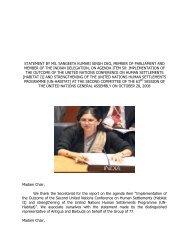
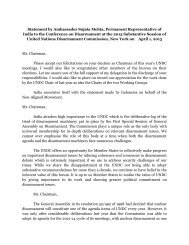
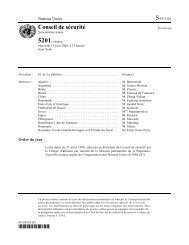
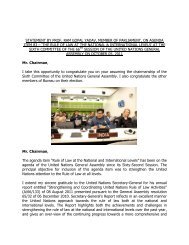
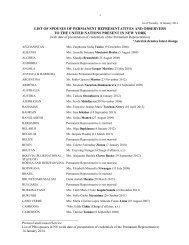
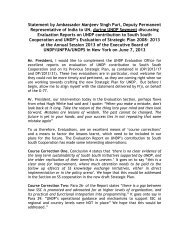
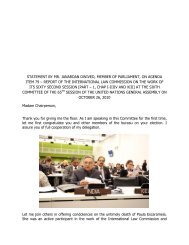
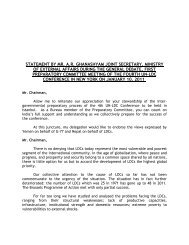
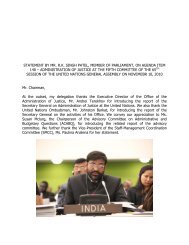
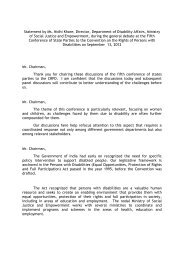
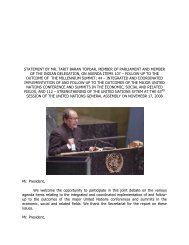
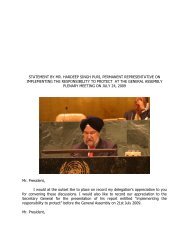
![1 statement by dr.[mrs] kakoli ghosh dastidar - Member States Portal](https://img.yumpu.com/27526598/1/190x245/1-statement-by-drmrs-kakoli-ghosh-dastidar-member-states-portal.jpg?quality=85)
